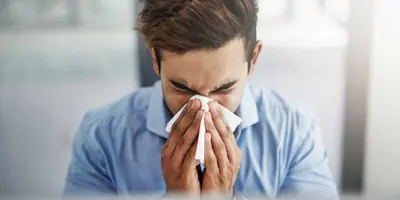17 people found this helpful

Weddings and weepy movies can make you well up, but watery eyes often have quite a different cause. Watery eyes can be down to all sorts of things, from allergies to blocked tear ducts. If your eyes are watering for no reason, we’ll help you identify the trigger, and answer the question: ‘why are my eyes watery?’
The most common causes if watery eyes
There are many causes of watery eyes, from allergies to blocked tear ducts or even eyestrain from staring at your phone! It’s important to note though that the causes of watery eyes are different to those of puffy eyes, so make sure to read our guide on puffy eyes causes and treatment too in order to have a well-rounded view of what’s happening.
Since you’ll need plenty of tissues to wipe away those tears, use a super soft tissue in a handy pocket pack for whenever you need to deal with watery eyes.
So what does watery eyes indicate? Keep reading to find out.
Allergies
Allergies can result in runny eyes. When you come into contact with an allergen – such as pollen outdoors, or dust mites, mould or pet dander indoors – red and watery eyes can form part of your allergic reaction, along with sneezing and a runny nose. That’s because the irritation prompts tear production.
Environmental factors
Do you find yourself saying, ‘why do my eyes water when I go outside’? Sometimes, watery eyes are a response to environmental factors that irritate your eyes, such as wind, dust, bright light, or dry air. This can lead to your eyes producing excess tears. Exposure to chemicals, smoke, or even an eyelash can result in runny eyes.
Dry-eye syndrome
Think your eyes are watering for no reason? The cause could be dry-eye syndrome. This is when the glands in your eyelids that produce an oily substance don’t function correctly. This oily substance slows down the evaporation of tears, so when it’s not there, you're left with dry watery eyes.
It sounds counter-intuitive, but when your eyes dry out, they produce extra tears as a reflex – so many tears that the natural drainage system can’t cope. You can read more about this on our dry eyes causes and symptoms guide.
Blocked tear ducts
When your tear ducts are blocked, the tears that your eyes naturally produce can’t drain away as easily. This creates an overflow of tears, leaving you with itchy watery eyes. Don’t worry though, blocked tear ducts almost always correct themselves; you just might look like you’ve been crying a little!
Eyelid issues
Your eyelids need to close correctly in order to spread your tears evenly over your eyes. If your eyelid turns inwards, or your lower eyelids droop and pull away, this can be what causes watery eyes. We’d recommend definitely speaking to your doctor if this is the case for you.
Eyestrain
You might need help for watery eyes if you experience eyestrain. This can be the result of staring at a screen for a long time, or any other activity that involves the eyes being focused in the same spot for prolonged periods, such as driving or reading.
People feel the effects of eyestrain the most at nighttime, so make sure to check out our tips on how to relieve watery eyes at night, including advice on cleaning your eyes and cutting down on screen time.
Cold, winter weather
If you find that your eyes water in cold weather, it could be indicative of the common cold. In winter we’re more prone to catching a cold because we spend more time indoors, where germs can spread more easily. So, if you have a sore throat and a cough with a stuffy nose too, it might all be be worth looking at our advice on how to relieve watery eyes during a cold.
Watery eyes treatment
Which watery eye treatment you choose to try will totally depend on what caused you eyes to water in the first place. For example, if it’s down to allergies, we'd recommend wearing wraparound sunglasses or avoiding going outside on high pollen count days.
If it’s due to eyestrain, it's worth taking regular breaks from screen-time, while other causes like eyelid issues, might require a doctor’s attention. Whatever the reason, you might find that a warm or cold compress brings you some relief for your runny eyes in the meantime.
Now that you have more information about the common causes of watery eyes, you’ll find it easier to decide on an appropriate course of action to soothe them. And don't forget to take a look at our range of Cushelle products!
Related articles
Runny nose remedies: 6 ways to stop a runny nose
Looking for a runny nose remedy you can make at home? For five family-friendly ways to stop a runny nose, click here.

What Causes Puffy Eyes? Causes and Treatments
Looking for a swollen eye allergy treatment? Need to know what to do for swollen eyes? Try our list of swollen eye allergy home remedy ideas.

Sneezing 101: Why do we sneeze and is sneezing good for you?
What does sneezing do? If you’ve been wondering is sneezing good for you, or the reasons behind why we sneeze, expand your knowledge here.

Sneezing during pregnancy: causes, dos and don’ts
Experiencing frequent sneezing in pregnancy or find sneezing hurts when pregnant? Click to learn why sneezing while pregnant is perfectly normal.

How to know the difference between allergies and a cold
What’s the difference between a cold and allergies? They both involve runny noses and sneezing! Here’s how to know the difference between a cold and allergies.

How to relieve sore watery eyes
When you’ve got watery eyes and a cold you can find some relief. Discover our tips on dealing with a runny eyes with a cold, here.



